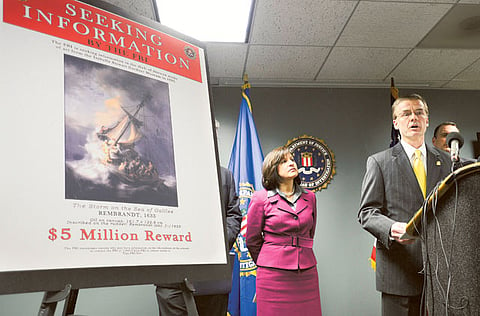FBI cracks 1990 Boston art heist
$500m robbery targeted masters’ paintings

Boston: The FBI believes it has identified the thieves who stole 13 artworks from Boston’s Isabella Stewart Gardner Museum in 1990 in the costliest art theft in US history and asked for anyone who had seen the paintings to contact the bureau.
On the 23rd anniversary of the theft, which stands as one of the most prominent unsolved crimes in modern Boston, officials said that their top priority was recovering the $500 million (Dh1,836 million) in missing art, which includes Rembrandt’s Storm on the Sea of Galilee and Edouard Manet’s Chez Tortoni.
The holes in the Gardner museum’s collection are prominent, in part because the empty frames that once held the paintings remain, empty, on the gallery walls due to a quirk in the will of the museum’s founder.
FBI officials said they believed the artworks were offered for sale in Connecticut and Philadelphia in the years after the heist and said they suspect much of the art could still be in the northeastern United States.
“It’s likely that over the years, someone — a friend, a neighbour or relative — has seen the art hanging on a wall, placed above a mantle or stored in an attic,” Richard DesLauriers, special agent in charge of the FBI’s Boston office, told a Monday press conference.
“We want that person to call us.”
The museum reiterated its offer of a $5 million reward for information that leads directly to the return of all the art.
Law enforcement officials said they could offer immunity from prosecution to anyone who comes forward to surrender the paintings. Any prosecution would focus on charges of possession or trafficking in stolen property, since the statute of limitations on prosecuting the original theft has expired.
“Immunity is available, it’s a very strong possibility,” said US Attorney Carmen Ortiz, noting that the artwork could be in the possession of people who were unaware it had been stolen.
Investigation
DesLauriers said the bureau had identified the suspected thieves, who he described as members of a criminal organisation with a presence in the mid-Atlantic states and New England. He said the FBI did not want to release the identities of its suspects because that could compromise its investigation.
The FBI called on anyone who had seen any of the missing art — which also includes works by Vermeer and Degas — to report it.
On the night of March 18, 1990, two men dressed as police officers arrived at the private museum’s front door, and a security guard let them in. The thieves allegedly overpowered both guards, who were found duct-taped to chairs in the museum’s basement the next morning.
The 13 stolen artworks included paintings, drawings, sculpture and a beaker. The FBI posted a website on Monday with photos and descriptions of the stolen works. (http://www.fbi.gov/news/stories/2013/march/reward-offered-for-return-of-stolen-gardner-museum-artwork)
Thieves rarely succeed in selling well-known stolen art for anything near its worth, said Robert Wittman, a former FBI agency who today works as a private art security and recover expert.
That is because artwork is easily identified as stolen and serious collectors and dealers look into a work’s origin before buying it.
“People who steal these types of paintings, they never monetise them,” Wittman said. Usually they are common criminals, they are involved in many areas of criminal activity — car theft, gun-running, and they don’t realise that the painting world is a whole different situation.”
Because of the difficulty of selling stolen art, there is a risk that the paintings taken from the Gardner museum have been destroyed or damaged, Wittman said.
“Once you cut it out of the frame and things get rolled up ... things deteriorate pretty quickly,” Wittman said.
The Gardner Museum was founded by Isabella Stewart Gardner, an art collector who died in 1924. Her will contained very specific conditions on the running of the museum, including the arrangement of her collection and free admission to anyone named Isabella, a practice that continues today.
The FBI solved Boston’s other long-running crime mystery in June 2011 when it found accused mobster James “Whitey” Bulger hiding in a seaside California community. Bulger, who is accused of committing or ordering 19 murders, was arrested on a tip that came in after the FBI launched a publicity campaign aimed at tracking him down. He had been on the run since 1994.
Sign up for the Daily Briefing
Get the latest news and updates straight to your inbox



